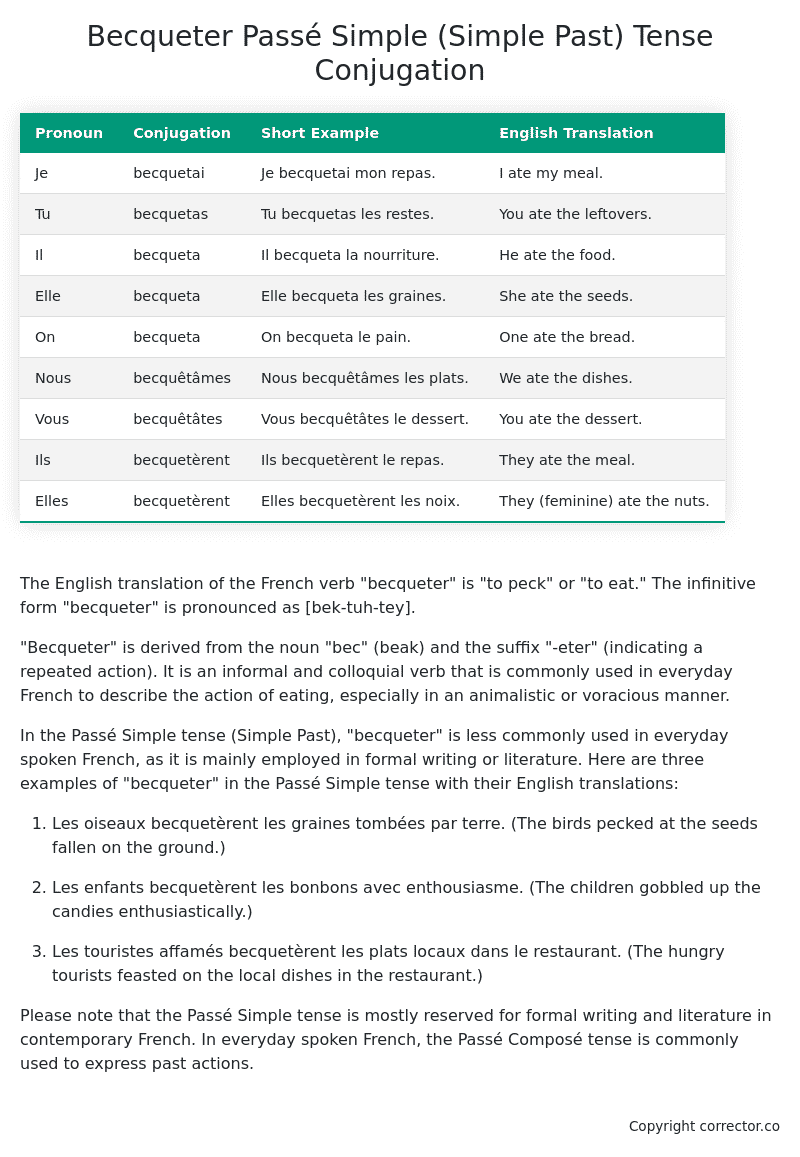Passé Simple (Simple Past) Tense Conjugation of the French Verb becqueter
Introduction to the verb becqueter
The English translation of the French verb “becqueter” is “to peck” or “to eat.” The infinitive form “becqueter” is pronounced as [bek-tuh-tey].
“Becqueter” is derived from the noun “bec” (beak) and the suffix “-eter” (indicating a repeated action). It is an informal and colloquial verb that is commonly used in everyday French to describe the action of eating, especially in an animalistic or voracious manner.
In the Passé Simple tense (Simple Past), “becqueter” is less commonly used in everyday spoken French, as it is mainly employed in formal writing or literature. Here are three examples of “becqueter” in the Passé Simple tense with their English translations:
-
Les oiseaux becquetèrent les graines tombées par terre.
(The birds pecked at the seeds fallen on the ground.) -
Les enfants becquetèrent les bonbons avec enthousiasme.
(The children gobbled up the candies enthusiastically.) -
Les touristes affamés becquetèrent les plats locaux dans le restaurant.
(The hungry tourists feasted on the local dishes in the restaurant.)
Please note that the Passé Simple tense is mostly reserved for formal writing and literature in contemporary French. In everyday spoken French, the Passé Composé tense is commonly used to express past actions.
Table of the Passé Simple (Simple Past) Tense Conjugation of becqueter
| Pronoun | Conjugation | Short Example | English Translation |
|---|---|---|---|
| Je | becquetai | Je becquetai mon repas. | I ate my meal. |
| Tu | becquetas | Tu becquetas les restes. | You ate the leftovers. |
| Il | becqueta | Il becqueta la nourriture. | He ate the food. |
| Elle | becqueta | Elle becqueta les graines. | She ate the seeds. |
| On | becqueta | On becqueta le pain. | One ate the bread. |
| Nous | becquêtâmes | Nous becquêtâmes les plats. | We ate the dishes. |
| Vous | becquêtâtes | Vous becquêtâtes le dessert. | You ate the dessert. |
| Ils | becquetèrent | Ils becquetèrent le repas. | They ate the meal. |
| Elles | becquetèrent | Elles becquetèrent les noix. | They (feminine) ate the nuts. |
Other Conjugations for Becqueter.
Le Present (Present Tense) Conjugation of the French Verb becqueter
Imparfait (Imperfect) Tense Conjugation of the French Verb becqueter
Passé Simple (Simple Past) Tense Conjugation of the French Verb becqueter (You’re reading it right now!)
Passé Composé (Present Perfect) Tense Conjugation of the French Verb becqueter
Futur Simple (Simple Future) Tense Conjugation of the French Verb becqueter
Futur Proche (Near Future) Tense Conjugation of the French Verb becqueter
Plus-que-parfait (Pluperfect) Tense Conjugation of the French Verb becqueter
Passé Antérieur (Past Anterior) Tense Conjugation of the French Verb becqueter
Futur Antérieur (Future Anterior) Tense Conjugation of the French Verb becqueter
Subjonctif Présent (Subjunctive Present) Tense Conjugation of the French Verb becqueter
Subjonctif Passé (Subjunctive Past) Tense Conjugation of the French Verb becqueter
Subjonctif Imparfait (Subjunctive Imperfect) Tense Conjugation of the French Verb becqueter
Subjonctif Plus-que-parfait (Subjunctive Pluperfect) Tense Conjugation of the French Verb becqueter
Conditionnel Présent (Conditional Present) Tense Conjugation of the French Verb becqueter
Conditionnel Passé (Conditional Past) Tense Conjugation of the French Verb becqueter
Conditionnel Passé II (Conditional Past II) Tense Conjugation of the French Verb becqueter
L’impératif Présent (Imperative Present) Tense Conjugation of the French Verb becqueter
L’impératif Passé (Imperative Past) Tense Conjugation of the French Verb becqueter
L’infinitif Présent (Infinitive Present) Tense Conjugation of the French Verb becqueter
L’infinitif Passé (Infinitive Past) Tense Conjugation of the French Verb becqueter
Le Participe Présent (Present Participle) Tense Conjugation of the French Verb becqueter
Le Participe Passé (Past Participle) Tense Conjugation of the French Verb becqueter
Struggling with French verbs or the language in general? Why not use our free French Grammar Checker – no registration required!
Get a FREE Download Study Sheet of this Conjugation 🔥
Simply right click the image below, click “save image” and get your free reference for the becqueter Passé Simple tense conjugation!

Becqueter – About the French Passé Simple (Simple Past) Tense
Formation
Usage
Narration
Historical Context
Interactions with other tenses
Passé Composé
Imparfait
Conditional and Subjunctive
Summary
I hope you enjoyed this article on the verb becqueter. Still in a learning mood? Check out another TOTALLY random French verb conjugation!


